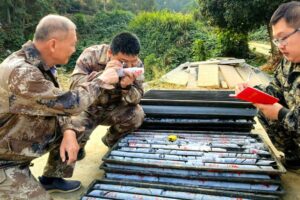
In an increasingly competitive and demanding global context, adding value to raw materials has become a fundamental strategy for agribusinesses seeking to boost their economic development and access international markets in a sustainable manner. Grupo Ruiz, a business conglomerate strongly rooted in the agribusiness of Northwestern Argentina, perfectly exemplifies the importance of this philosophy and how to put it into practice successfully.
The concept of adding value in agribusiness focuses on the transformation of agricultural raw materials into new products, which stand out for their unique characteristics and satisfy the demands of the international market.
This transformation involves the use of advanced technologies, the promotion of research and development, as well as the adoption of sustainable practices that contribute to raising the quality and competitiveness of products.
Through this value-added strategy, the possibility of obtaining more favorable prices in global markets is achieved, while reducing vulnerability to the volatility of raw material prices.raw ace.
The beginnings
The history of Grupo Ruiz dates back to 1994 with its foundation and an objective initially dedicated to the production and export of black beans.
Since its inception, Grupo Ruiz adopted a solid family business culture, based on values such as responsible competitiveness, good commercial and productive practices, and a focus on continuous improvement. Thanks to this vision, in less than a decade, it managed to establish itself as one of the world’s leading producers and exporters of black beans, its flagship product.
But Grupo Ruiz’s focus was not limited to the mere export of this agricultural raw material. From very early on, they embraced the philosophy of adding value through the transformation, processing and strategic marketing of their products. This allowed them to access more profitable markets and position their offer in a differentiated way on the global stage.
Expansion and diversification
Grupo Ruiz’s experience in the development of global markets, the establishment of solid commercial relationships with clients around the world and the constant application of good production and commercial practices laid the foundations for the expansion and diversification of the Group towards other agri-food business sectors. .
In 2016, taking a bold step, they ventured into citrus farming, exporting various varieties of superior quality lemons to the five continents under the brands NoniLemon, Yatasto and Yánima. To do this, they took advantage of their solid logistics and foreign trade infrastructure, as well as their vast experience in the comprehensive management of agroindustrial value chains.
Strategic investments in cutting-edge infrastructure
Understanding that adding value requires a significant investment in resources and capabilities, Grupo Ruiz has allocated substantial efforts and capital to develop cutting-edge operational infrastructure.
An example of this is its processing plants equipped with state-of-the-art technology, with the capacity to process up to 500 tons of grains per day and have all the necessary certifications to enter the most demanding markets, such as Primus GFS and those issued by the International Organization. Agriculture for organic products.
But the investments don’t stop there. Grupo Ruiz has built its own railway stations, expanded its storage capacities to 34,000 m2 and is currently working on a new 77-hectare industrial and logistics park in Tucumán, a visionary project that seeks to position itself as a pole of excellence for agribusiness, mining and logistics in the NOA and Argentina.
These investments allow them to apply the best production practices, optimize the use of resources, guarantee the quality and competitiveness of their products, and vertically integrate their operations to maximize the added value at each stage of the chain.
Human capital and international quality standards
A fundamental pillar of Grupo Ruiz’s strategy is to have highly trained technical and professional teams in all areas, thus ensuring the application of best practices and compliance with international quality and food safety standards.
This policy of continuous training and attraction of the best talent has allowed them to obtain high-level certifications such as Primus GFS, as well as those issued by the International Agricultural Organization for the production and marketing of organic products in demanding markets such as the United States and Europe.
But, beyond the productive and commercial aspects, Grupo Ruiz has demonstrated a solid commitment to sustainable development in all its operations. They have adopted policies to preserve the environment, optimize the use of natural and industrial resources, and generate genuine employment in the localities where their companies operate.
This approach to responsible competitiveness and sustainability reflects its roots in the Argentine Northwest Region, where they have their roots, and their contribution to the economic and social progress of the communities that host them.
Future vision and strategic projects
Grupo Ruiz’s vision for the future points towards sustainable growth, with ambitious strategic projects underway. One of them is the development of a new industrial and logistics park of excellence in Tucumán, which seeks to position itself as a key mining, industrial and logistics hub for the NOA and Argentina, attracting investments and generating business opportunities in the region.
Another key project is the consolidation of the San Carlos Establishment in Salta, a top-level feedlot with capacity for 25,000 simultaneous heads, which will allow them to strengthen their presence in the production and export of high quality meat, taking advantage of synergies with their other agro-industrial operations. .
But the expansion plans don’t stop there. Grupo Ruiz constantly analyzes business diversification opportunities that allow them to maximize the use of their current and future strengths, both in infrastructure and in knowledge and capabilities.
Leaders in value addition
Agribusiness represents a fundamental piece in the global economy and the process of adding value constitutes an essential vehicle for achieving economic and social objectives. This strategy not only confers added value to the products, but also opens the doors to access to international markets, thus facilitating exports and generating growth and development opportunities for the nations that take advantage of it.
With a shared vision and well-articulated policies, the path can be paved towards a future in which agribusiness and the addition of value to raw materials play an even more influential role in economic and social development, generating prosperity on the scene. global.
Grupo Ruiz is the exemplification of how agribusiness can promote economic and social development through the value addition strategy, transforming agricultural raw materials into products of higher quality and profitability, accessing international markets and generating employment and investment opportunities in the regions where they operate.
Their comprehensive approach, ranging from primary production to global marketing, their commitment to sustainability and local development, their constant investment in cutting-edge infrastructure and human capital, and their vision of continuous growth through diversification position them as leaders in adding value in the Argentine agribusiness and a model to follow in the region. Grupo Ruiz demonstrates that with a well-executed strategy, agribusiness can be an engine for business development and the national economy.

Journalist and passionate about the Asian world.
Source: https://reporteasia.com/economia/2024/04/11/grupo-ruiz-agregado-valor-agronegocios/

